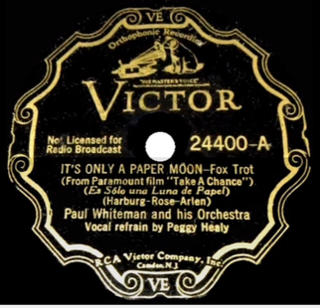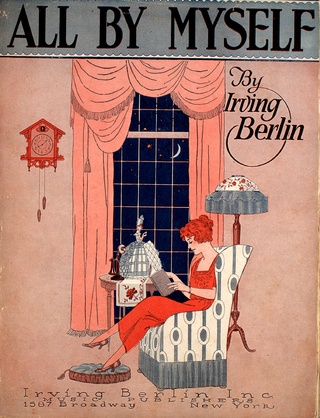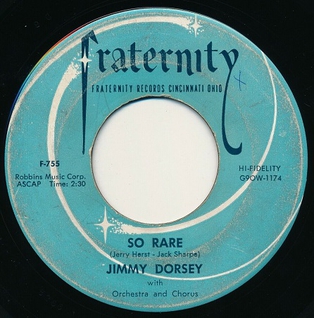Related Research Articles
"What Is This Thing Called Love?" is a 1929 popular song written by Cole Porter, for the musical Wake Up and Dream. It was first performed by Elsie Carlisle in March 1929. The song has become a popular jazz standard and one of Porter's most often played compositions.
"All Alone" is a popular waltz ballad composed by Irving Berlin in 1924. It was interpolated into the Broadway show The Music Box Revue of 1924 where it was sung by Grace Moore and Oscar Shaw. Moore sat at one end of the stage under a tightly focused spotlight, singing it into a telephone, while Oscar Shaw sat at the other, doing the same.
"They Can't Take That Away from Me" is a 1937 popular song with music by George Gershwin and lyrics by Ira Gershwin. It was introduced by Fred Astaire in the 1937 film Shall We Dance and gained huge success.
"Heat Wave" is a popular song written by Irving Berlin for the 1933 musical As Thousands Cheer, and introduced in the show by Ethel Waters.

"A Fine Romance" is a popular song composed by Jerome Kern with lyrics by Dorothy Fields, published in 1936.

"It's Only a Paper Moon" is a popular song published in 1933 with music by Harold Arlen and lyrics by Yip Harburg and Billy Rose.
"You Belong to My Heart" is the name of an English-language version of the Mexican Bolero song "Solamente una vez". This song was composed by Mexican songwriter Agustín Lara and originally performed by singer Ana María González and tenor José Mojica in the 1941 film Melodías de América.
"Street of Dreams" is a song and foxtrot composed in 1932 by Victor Young, with lyrics by Sam M. Lewis. There were three successful recordings of the song in 1933 by Guy Lombardo, Ben Selvin and Bing Crosby.

"Amor", also known as "Amor Amor" and "Amor Amor Amor" is a popular song published in 1943.
"I'm Putting All My Eggs in One Basket" is a popular song written by Irving Berlin for the 1936 film Follow the Fleet, where it was introduced by Fred Astaire and Ginger Rogers. Astaire had a huge hit with the song in 1936 and other popular versions that year were by Jan Garber and by Guy Lombardo.
"Isn't This a Lovely Day?" is a popular song written by Irving Berlin for the 1935 film Top Hat, where it was introduced by Fred Astaire in the scene where his and Ginger Rogers' characters are caught in a gazebo during a rainstorm. The lyric is an example of a song which turns a bad situation into a love song, a common style for Irving Berlin, as in I've Got My Love to Keep Me Warm and Let's Have Another Cup of Coffee.
"Now It Can Be Told" is a popular song written by Irving Berlin for the 1938 film Alexander's Ragtime Band, where it was introduced by Alice Faye and Don Ameche. It was nominated for an Academy Award in 1938 but lost out to "Thanks for the Memory".
"You Keep Coming Back Like a Song" is a popular song written by Irving Berlin for the 1946 film Blue Skies, where it was introduced by Bing Crosby. The song was nominated for "Best Song" in 1946 but lost out to "On the Atchison, Topeka and the Santa Fe". Dinah Shore's version was biggest in the US reaching the No. 5 spot, while Crosby's version peaked at No. 12. Jo Stafford also had chart success with it and her version achieved the No.11 position.

"Lazy" is a popular song written by Irving Berlin in 1924. Popular recordings of the song in 1924 were by Al Jolson, Blossom Seeley, Paul Whiteman and the Brox Sisters. The best known version today may be that performed by Marilyn Monroe, Donald O'Connor, and Mitzi Gaynor in the motion picture There's No Business Like Show Business.
"Say It Isn't So" is a popular torch song by Irving Berlin, published in 1932. The song was written when Berlin was suffering a loss of confidence following several setbacks, and he initially placed the song in a drawer, feeling that it would not be successful. However, one of Berlin's employees, Max Winslow, heard it, and on his own initiative, took it to Rudy Vallée, who was then a major star on radio. Vallee sang it on his radio show and it became an immediate hit.

"All by Myself" is a popular song written by Irving Berlin, published in 1921.

"So Rare" is a popular song published in 1937 by composer Jerry Herst and lyricist Jack Sharpe. It became a no. 2 chart hit for Jimmy Dorsey in 1957.
Billboard Pop Memories is a series of compilation albums released by Rhino Records in 1994, each featuring ten hit recordings spanning a five- or ten-year period from the 1920s through the 1950s.
"Siboney", also known as "Canto Siboney", is a 1927 song by Cuban composer Ernesto Lecuona. It was part of the 1927 revue La tierra de Venus, which featured singer Rita Montaner. The music is in cut time, originally written in C major. The lyrics were reportedly written by Lecuona while away from Cuba and is about the homesickness he was experiencing. The term "Siboney" refers to one of the indigenous tribes that inhabited Cuba before the arrival of the Spanish colonists and acts as a symbol for the island.
"I Can't Believe That You're in Love with Me" is a 1926 popular song and jazz standard composed by Jimmy McHugh, with lyrics by Clarence Gaskill.
References
- ↑ Bergreen, Laurence (1990). As Thousands Cheer - The Life of Irving Berlin . New York: Viking Penguin. pp. 287, 306. ISBN 0-340-53486-9.
- ↑ Whitburn, Joel (1986). Joel Whitburn's Pop Memories 1890-1954 . Wisconsin, USA: Record Research Inc. p. 511. ISBN 0-89820-083-0.
- ↑ "A Bing Crosby Discography". BING magazine. International Club Crosby. Retrieved September 2, 2017.
- ↑ Victoria Cordova & The Alfredo Antonini Orchestra performing "How Deep Is the Ocean" for Muzak (circa 1949) as archived at the Library of Congress Online Catalog at catalog.loc.gov]
- 1 2 3 4 5 6 7 8 9 10 11 12 Gioia, Ted (2012). The Jazz Standards: A Guide to the Repertoire. New York City: Oxford University Press. pp. 148–149. ISBN 978-0-19-993739-4.
- ↑ "Record Reviews and Possibilities: Artie Shaw (Musicraft 409 and 412)". Billboard. November 2, 1946. p. 26.